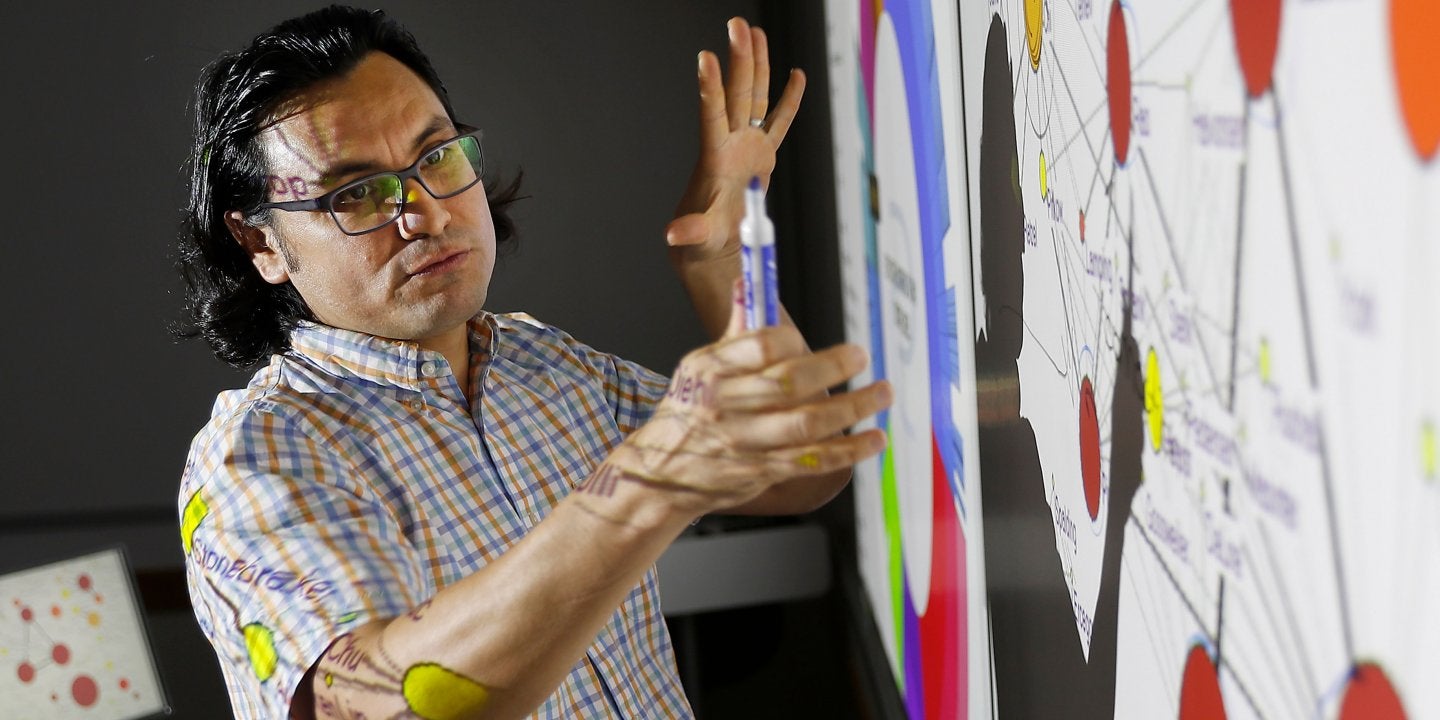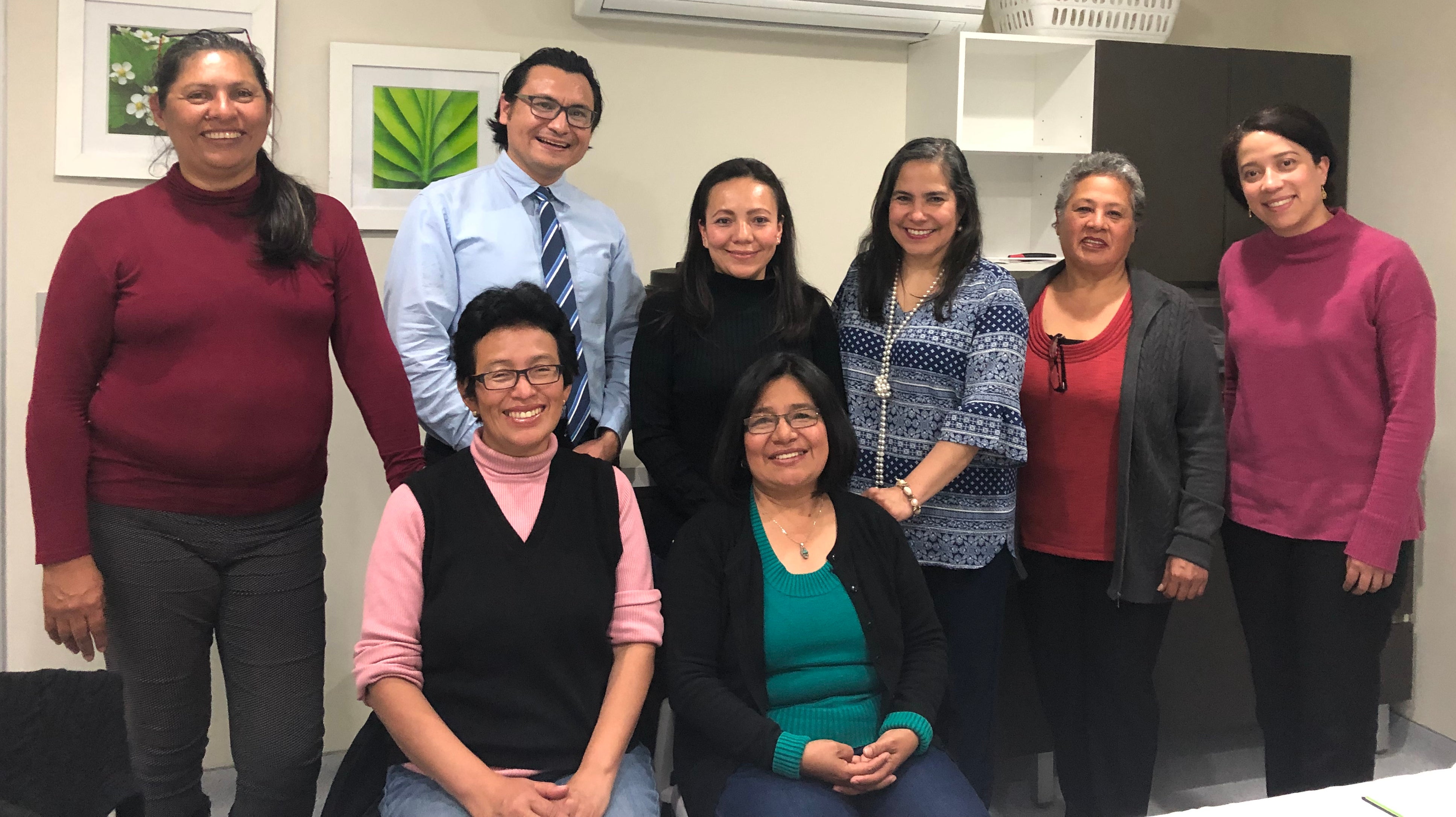Supporting Guatemalan Healthcare through Improved Access to Clinical Literature

Shortly after Fulbright Scholar Manuel de la Cruz Gutierrez joined the University of Pennsylvania’s Biomedical Library in 2014, he became involved with the Perelman School of Medicine’s long-standing partnership with a group of Guatemalan universities and Maya communities.
“I had a particular interest in the region because I’m from Latin America,” explains de la Cruz Gutierrez, who is the Biomedical Library’s Director of Data & Innovation Services. “And Penn Libraries already had a burgeoning relationship with these universities and communities. I felt that my scholarly expertise could be of use in shaping future collaboration.”
One of the ongoing objectives of the Guatemala-Penn Partners (GPP) program has been to create healthcare research capabilities with scientists and health professionals in Guatemala. Thus, every year Penn has invited a cohort of talented Guatemalan students, community members, and academic leaders to come to Philadelphia from Guatemala to learn at Penn, including training for masters’ degrees in epidemiology.
In exchange, the Hospitalito Atitlán in Santiago Atitlán offers clinical rotations to Perelman, School of Nursing, School of Arts and Sciences, Wharton, Weitzman, Dental, and School of Engineering and Applied Science students.
“The mission of the Guatemala-Penn Partners program is to create knowledge, develop learners, and provide services to improve health and development,” says Kent Bream, Associate Professor of Clinical Family Medicine and Community Health at Perelman and Director of the GPP. “And the program has successfully created a mutually beneficial relationship with our partner institutions in Guatemala.”
The GPP program also hosts and provides faculty for the Scientific Lecture Series (SLS) in Guatemala, which is open to established and prospective Guatemalan scientists alike. Through the SLS, the GPP is presently evolving to improve the very infrastructure of Guatemalan healthcare research.
The need for infrastructural improvement is a pressing one. Guatemala has the sixth-highest rate of chronic malnutrition in the world, with indigenous children twice as likely as nonindigenous children to exhibit diet-related growth deficiencies (59% vs. 31%). A June 2018 sector brief by the U.S. Agency for International Development concluded that “the health status of poor and indigenous Guatemalans, who comprise close to half of the total population, continues to be among the worst in the Western Hemisphere.”
The relative dearth of physicians, dentists, and nurses compounds the healthcare-related difficulties facing so many Guatemalans. “Physician density” refers to the number of doctors per 1,000 inhabitants of a given country and is taken as an indication of the overall “health” of a country’s healthcare system. According to the World Factbook, the physician density of the United States is 2.59, whereas that of Guatemala is .36.
The GPP is actively working to improve health in Guatemala by raising human capital in both academic medicine and public health. “Our partnership is an international model for global development and trans-American academic partnerships,” says Bream. “Libraries sit at the core of that model, as they support the dissemination of knowledge that creates change.”
A key part of a Libraries-led solution to Guatemala’s healthcare crisis will be implementation science, the studied application of evidence-based practices in real-world settings. “Penn has expertise in implementation science,” says de la Cruz Gutierrez, “and implementation science can benefit any healthcare system.”
De la Cruz Gutierrez describes implementation science as a multidisciplinary and composite discipline which entails methods of monitoring, evaluation, and operations research to determine and instate pertinent evidence-based practices. He notes that evidence-based practices are typically established in clinical trials that have been conducted in controlled environments. The discipline of implementation science therefore accommodates both loss of experimental control in real-world settings as well as the infrastructural and cultural particularities of a given environment.
Last year, as part of the SLS, de la Cruz Gutierrez conducted literature-focused implementation science training in a hospital in Guatemala. The impact of the training was necessarily limited, however; due to disadvantageous licensing terms, most institutions in Guatemala lack reliable access to the clinical literature that constitutes the foundation of implementation science.

“Manuel was one of our SLS instructors to whom our partners expressed their need for greater access,” says Bream. The person who invited de la Cruz Gutierrez to present — Erwin Calgua Guerra — was, by that point, already envisioning a consortium of medical librarians in Guatemala who would form a pooled market and thus create leveraging power to get better terms for electronic resources from journals.
The latest instantiation of the GPP, then, has been a libraries-led effort to get affiliate Guatemalan universities access to the evidence necessary for the establishment of site-specific, evidence-based practices.
It’s worth noting that the political partisanship of Guatemalan universities typically makes such collaboration difficult. However, the origin of the GPP laid the groundwork for nonpartisan cooperation. Fifteen years ago, a group of Penn professors visiting Guatemala fortuitously connected with Sergio Martinez Siekavizza. Martinez Siekavizza is an Associate Professor of Orthopaedic Surgery at a Libertarian university but has also worked with the public social security health system and a left-leaning public university, so was able to introduce the Penn professors to both conservative and liberal contacts. Thus, the librarians with whom de la Cruz Gutierrez is collaborating hail from institutions across the political spectrum.
In preparation for the initial training, de la Cruz Gutierrez conferred with Penn Libraries colleagues Jeanne Shuttleworth, Director of Acquisitions, Access, & Licensing, and Brigitte Weinsteiger, Associate University Librarian for Collections, to ask what advice they could offer about consortia “that would translate to the needs of our Guatemalan partners.”
He learned that negotiating through consortia results in considerable staff time savings — since every institution need not reread and renegotiate their own annual contracts — and that consortia can typically broker better deals than individual institutions. (Cost savings are sometimes, though not always, a benefit.)
He also learned that while U.S. institutions can share electronic resources amongst each other so long as they charge each other accordingly, resource-sharing is prohibited in Guatemala. “The companies there insist on subscription,” de la Cruz Gutierrez explains. “The licensing terms are all-or-nothing.” And that’s neither financially nor logistically feasible for most Guatemalan universities.
De la Cruz Gutierrez is now working with librarians from six Penn-partnered Guatemalan universities to form a pilot consortium. To address the consequent gap in information access in Guatemala, de la Cruz Gutierrez is currently researching whether or not there’s precedent for a U.S. institution to provide electronic resource access to Latin American institutions.
In the interim — and in the same spirit as its decades-old partnership — Penn Libraries is providing its Guatemalan affiliates access to both print (via Scan and Deliver) and electronic collections. Affiliate librarians are simultaneously tracking which resources they’re most frequently requesting, and, therefore, which they would be most interested in licensing on their own.
“This is a data-gathering phase,” says de la Cruz Gutierrez. A few of the partner institutions lack medical schools but have courses of study in bioinformatics or nursing. Affiliate librarians will therefore identify which resources the consortium as a whole should possess, and, more specifically, which institutions should be in possession of licenses for particular journals to meet their research needs.
The project will be assessed at six months, with bimonthly virtual meetings to gauge progress. “Penn has played a role in facilitating initial collaboration, in getting the project jump-started,” says de la Cruz Gutierrez. “But that role is intentionally delimited. The end goal remains for Guatemalan universities to manage their own resources and on their own terms.”
Date
January 8, 2020
